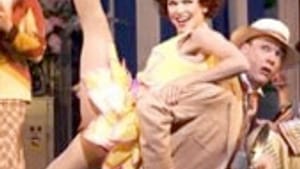Stay in the Loop
BSR publishes on a weekly schedule, with an email newsletter every Wednesday and Thursday morning. There’s no paywall, and subscribing is always free.
"Drowsy Chaperone' at Academy

An original take on the Roaring '20s
STEVE COHEN
The Drowsy Chaperone is a wonderful show. I just hope no one tries to imitate it, as usually happens when a musical is this successful. But Drowsy Chaperone impresses because it’s original and clever, and you only can be original once.
You may wonder where I see originality in a musical that pays homage to the genre of Broadway Roaring ‘20s song-and-dance shows. Other productions, like Thoroughly Modern Millie, The Boy Friend, My One and Only and Crazy For You, copied plots, costumes and song styles from that era. But Drowsy Chaperone does much more.
The leading character, known simply as Man in Chair, is an enraptured devotee of old musicals, and this play is about him, more than anything else. We see him reveal new parts of his personality as the evening progresses, and Jonathan Crombie, as the Man, is engaging.
As The Man puts LP records on the turntable in his drab apartment, he tells us the story of this faux-musical and of its creators. So detailed and evocative is his telling that some audience members may feel he’s talking about a real ’20s musical. As each character’s song begins, that performer appears before us in colorful costume. The Man also dishes dirt about the "real-life" performers who originated these roles.
The music and lyrics by Lisa Lambert and Greg Morrison are catchy and clever, and there are standout performances by singers and dancers, so there’s a lot worthwhile going on. Casey Nicholaw directs and choreographs. Especially good is Debra Monk as the title character, an older lady known for heavy drinking and for hogging the spotlight. Her big number, "As We Stumble Along," is a take-off of every inspirational ballad you’ve ever heard. Equally impressive is Richard Vida, a balding, middle-age singer-actor who’s a spectacular dancer.
The Man sounds outrageous when he recounts the blatant racial prejudice of some 1920s song lyrics. But he isn’t exaggerating. I once sang in a production of the Gershwins’ Girl Crazy with its original script. The audience was expected to laugh at American Indians who said "Ugh" and spoke in Yiddish. Then I, as a Manhattan cab driver, had to deliver the line: "Oy gevalt, a Yiddishe Indian!", thus stereotyping two minority groups simultaneously. And, imagine— these words were by one of the most sophisticated authors of his time, Ira Gershwin.
Because such theatrical history lurks behind The Drowsy Chaperone’s jokes, the comedy impresses us even more.
STEVE COHEN
The Drowsy Chaperone is a wonderful show. I just hope no one tries to imitate it, as usually happens when a musical is this successful. But Drowsy Chaperone impresses because it’s original and clever, and you only can be original once.
You may wonder where I see originality in a musical that pays homage to the genre of Broadway Roaring ‘20s song-and-dance shows. Other productions, like Thoroughly Modern Millie, The Boy Friend, My One and Only and Crazy For You, copied plots, costumes and song styles from that era. But Drowsy Chaperone does much more.
The leading character, known simply as Man in Chair, is an enraptured devotee of old musicals, and this play is about him, more than anything else. We see him reveal new parts of his personality as the evening progresses, and Jonathan Crombie, as the Man, is engaging.
As The Man puts LP records on the turntable in his drab apartment, he tells us the story of this faux-musical and of its creators. So detailed and evocative is his telling that some audience members may feel he’s talking about a real ’20s musical. As each character’s song begins, that performer appears before us in colorful costume. The Man also dishes dirt about the "real-life" performers who originated these roles.
The music and lyrics by Lisa Lambert and Greg Morrison are catchy and clever, and there are standout performances by singers and dancers, so there’s a lot worthwhile going on. Casey Nicholaw directs and choreographs. Especially good is Debra Monk as the title character, an older lady known for heavy drinking and for hogging the spotlight. Her big number, "As We Stumble Along," is a take-off of every inspirational ballad you’ve ever heard. Equally impressive is Richard Vida, a balding, middle-age singer-actor who’s a spectacular dancer.
The Man sounds outrageous when he recounts the blatant racial prejudice of some 1920s song lyrics. But he isn’t exaggerating. I once sang in a production of the Gershwins’ Girl Crazy with its original script. The audience was expected to laugh at American Indians who said "Ugh" and spoke in Yiddish. Then I, as a Manhattan cab driver, had to deliver the line: "Oy gevalt, a Yiddishe Indian!", thus stereotyping two minority groups simultaneously. And, imagine— these words were by one of the most sophisticated authors of his time, Ira Gershwin.
Because such theatrical history lurks behind The Drowsy Chaperone’s jokes, the comedy impresses us even more.
Sign up for our newsletter
All of the week's new articles, all in one place. Sign up for the free weekly BSR newsletters, and don't miss a conversation.

 Steve Cohen
Steve Cohen